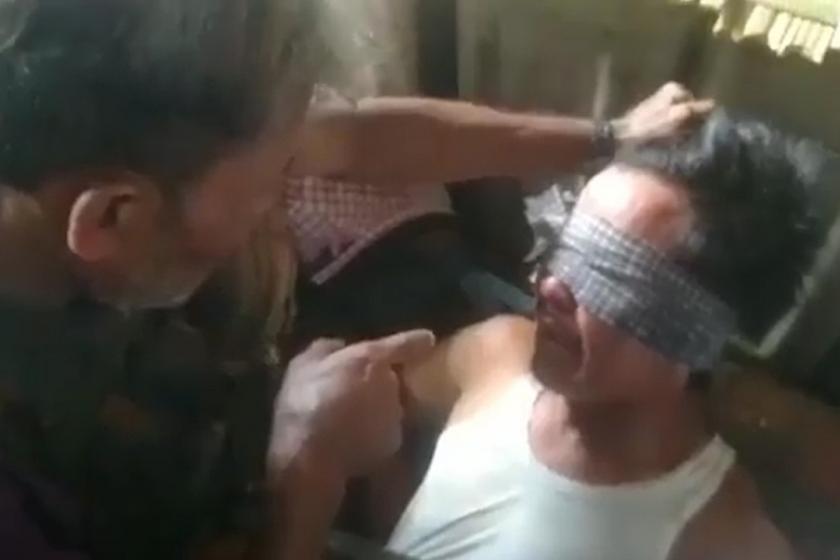On Wednesday May 13, Myanmar Army also known as the Military or Tatmadaw which is often used interchangeably, said that it was investigating its soldiers who were seen beating and threatening to kill the suspected civilians to be insurgents belonging to the Arakan Army (AA), battling it starting 2015.

Earlier on April 13, the Tatmadaw and AA engaged in clashes close to Ponnagyun’s Kyauk Seik village, followed up by Tatmadaw’s shelling of the settlement, killing eight and injuring more than a dozen of civilians.
Six days later Tatmadaw detained 38 villagers of the bombarded village for questioning over suspicion to have connection to the AA. However, 33 were released the following day but 5 were taken into custody.
On April 25, Nyi Nyi Aung, 24, Myo Lin Oo, 23, and Maung Chay, 32, all are from Kyauk Seik; Myo Min Aung, 37, from Ponnaygun; and Kyaw Win Than, 23, from Sittway; were transferred to the police station in Ponnaygun.
At 8 o’clock in the morning on April 27, the soldiers from Sittway and Light Infantry Battalion 550 took them by military trucks to the navy ship that was docking near Guwa Pagoda, about half a mile from Kyauk Seik, according to Arakan News of May 11.
The videos contain three clips. The first clip is boarding the victims on the navy ship with pagoda background. The second one is the soldiers wearing civilian clothes questioning and beating. The third clip is 2.45 minutes long, in which the soldiers cruelly and inhumanly torturing the victims could be seen.
One of the soldiers forced the villagers to confess that they are members of AA and said they would be killed if they didn’t tell the truth.
Since May 7, the five males have been returned to Ponnagyun Myoma Police Station, awaiting trial. They were being sued with Counter Terrorism Law Section 50 (j) and 51 (a).
An official of the Tatmadaw’s True News agency Brigadier General Zaw Min Tun said the soldiers acted illegally and that they will be investigated and faced punishment according to military justice if found guilty.
He said: “Our investigation verified that Tatmadaw members were involved in the incident,” according to Myanmar Times.
“We have rules and regulations. The soldiers were not authorised to carry out unlawful interrogations,” he added. “We take full responsibility and accountability for this incident.”
In the same vein, Major General Tun Tun Nyi, also from Tatmadaw’s True News agency said: “As it is not according to the prescribed rules (procedure) we will take action (against the perpetrators) as necessary,” reported Myanmar Now recently.
However, Phil Robertson, deputy Asia director of New York-based Human Rights Watch doesn’t think that justice will be done for the five males who had been tortured by employing the Military set up investigation committee.
“When I hear that the Tatmadaw [Myanmar military] is setting up an investigation committee, I realize that there’s not going to be any progress whatsoever on that case,” he pointed out, according to the Radio Free Asia (RFA) report.
“The fact that we have these people taken out of a police station by the military, and then allegedly tortured on a boat, and then sent back to the police indicates just how above-the-law the military is,” he mentioned.
Robertson said instead of the Military investigation committee, a full impartial, neutral group will be more appropriate to do the job.
His doubtfulness and suspicion is understandable and justified, as in the trial of In Din massacre, where ten Rohingya were killed and buried in mass grave, seven convicted Tatmadaw soldiers and local paramilitaries sentenced to ten years with hard labors were released after less than a year in prison, by order of the commander-in-chief.
In “Burma Soldier” a documentary released in 2010, directed by Ni Dunlop, Annie Sundberg, and Ricki Stern explained clearly the indoctrination of the Tatmadaw on its soldiers that formed the organization’s mindset.
In the documentary, Myo Myint, a political prisoner, who made the transformation from being a soldier in Burma’s junta to a pro-democracy activist narrated the indoctrination as: “The boys starting from when they join the army, have been ramped up into their heads (the military mindset). Another thing is that the people fighting in the front line (in ethnic states) are all their enemies, people destroying the country and terrorists. Because of that the terrorists, including those who support and empower them are all terrorists. The terrorists and those, one way or the other, involved with them could be done away with the way they (Tatmadaw soldiers) like it.”
He explained that the indoctrination included to become killing machine without consideration in ethnic nationalities areas, which were considered enemy territories and the population outright enemies.
If what have been happening in all ethnic states are of indications, especially now in Arakan State, the Tatmadaw hasn’t change its behavior vis-à-vis the ethnic nationalities. In other words, implementation of the kangaroo court is still the norms where Tatmadaw’s dealing with the ethnic population is concerned.
Starting from mid-April to May 11, 45 civilians were killed and 87 wounded in northern Arakan (Rakhine) State and Chin State’s Paletwa Township, according to the RFA compiled statistics recently.
During 2019 because of Tatmadaw’s interrogation 15 civilians died due to tortures said the victims’ family members and the Arakan State parliamentary representatives, according to The Irrawaddy May 11 report.
As such, the Tatmadaw’s piecemeal public relation show to be revamping itself into a protector of democratic system role, playing by the rules is an open question, in which the jury is still out.












Leave a Comments